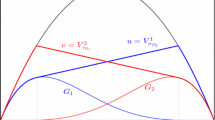Abstract
We study nonzero-sum stopping games with randomized stopping strategies. The existence of Nash equilibrium and ɛ-equilibrium strategies are discussed under various assumptions on players random payoffs and utility functions dependent on the observed discrete time Markov process. Then we will present a model of a market game in which randomized stopping times are involved. The model is a mixture of a stochastic game and stopping game.
Similar content being viewed by others
References
Bobecka K, Ferenstein EZ (2001) On nonzero-sum stopping game related to discrete risk process. Control Cybern 30:339–354
Chow YS, Robbins H, Siegmund D (1971) Great expectations: the theory of optimal stopping. Houghton Mifflin, Boston
Domansky V (2002) Dynkin’s game with randomized optimal stopping rules. Ann Int Soc Dyn Games 7:247–262
Duffie D, Geanakoplos J, Mas-Colell A, McLennan A (1994) Stationary Markov equilibria. Econometrica 62:745–781
Dynkin EB (1969) Game variant of a problem on optimal stopping. Soviet Math Dokl 10:270–274
Enns EG, Ferenstein EZ (1987) On a multi-person time-sequential game with priorities. Sequential Anal 6:239–256
Fan K (1966) Applications of a theorem concerning sets with convex sections. Math Annalen 163:189–203
Ferenstein EZ (1992) Two-person non-zero-sum game with priorities. In: Ferguson TS, Samuels SM (ed) Contemporary Mathematics, vol 125, pp 119–133
Ferenstein EZ (1993) A variation of the Dynkin’s stopping game. Math Jpn 38:371–379
Ferenstein EZ (2005) On randomized stopping games. Ann Int Soc Dyn Games 7:223–233
Ferguson TS (1967) Mathematical statistics. A decision theoretic approach. Academic, New York
Irle A (1995) Games of stopping with infinite horizon. ZOR—Math Meth Oper Res 42:345–359
Karatzas I, Shubik M and Sudderth WD (1994) Construction of stationary Markov equilibria in a strategic market game. Math Oper Res 19:975–1006
Nash J (1951) Non-cooperative games. Ann Math 54:286–295
Neveu J (1975) Discrete parameter martingales. North-Holland, Amsterdam
Neumann P, Ramsey D, Szajowski K (2002) Randomized stopping times in Dynkin games. ZAMM Z Angew Math Mech 82:811–819
Nowak AS, Szajowski K (1999) Nonzero-sum stochastic games. Ann Int Soc Dyn Games 4:297–343
Nowak AS, Altman E (1998) ɛ-equilibria for stochastic games with uncountable state space and unbounded costs. Mimeo, Institute of Mathematics, Wrocław University of Technology, Wrocław
Nowak AS (2003) On a new class of nonzero-sum discounted stochastic games having stationary Nash equilibrium points. Int J Game Theory 32:121–132
Ohtsubo Y (1987) A nonzero-sum extension of Dynkin’s stopping problem. Math Oper Res 12:277–296
Ohtsubo Y (1991) On a discrete-time non-zero-sum Dynkin problem with monotonicity. J Appl Probab 28:466–472
Rosenberg D, Solan E, Vieiile N (2001) Stopping games with randomized strategies. Probab Th Related Fields 119:433–451
Solan E, Vieille N (2001) Quitting games. Math Oper Res 26:265–285
Yasuda M (1986) On a randomized strategy in Neveu’s stopping problem. Stoch Process Appl 21:159–166
Author information
Authors and Affiliations
Corresponding author
Additional information
Research supported by grant PBZ-KBN-016/P03/99.
Rights and permissions
About this article
Cite this article
Ferenstein, E.Z. Randomized stopping games and Markov market games. Math Meth Oper Res 66, 531–544 (2007). https://doi.org/10.1007/s00186-006-0143-8
Received:
Revised:
Published:
Issue Date:
DOI: https://doi.org/10.1007/s00186-006-0143-8




